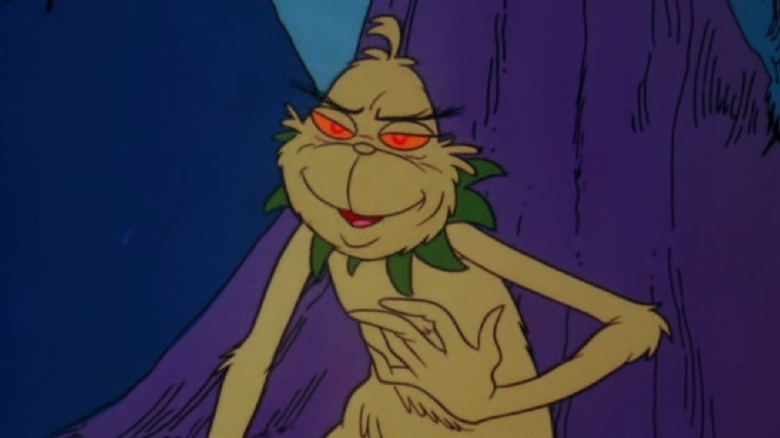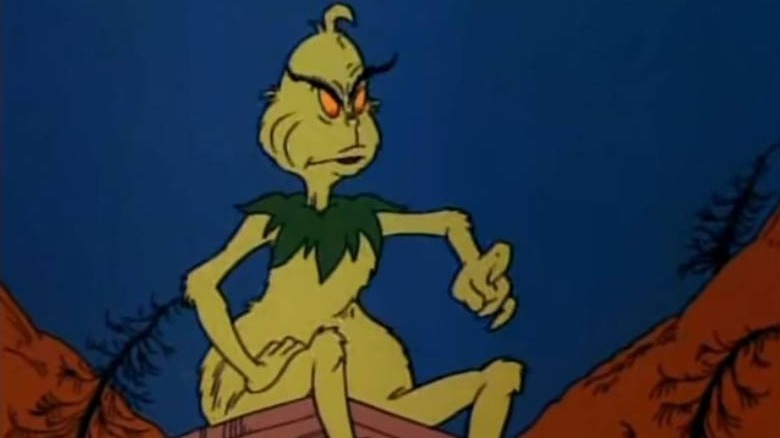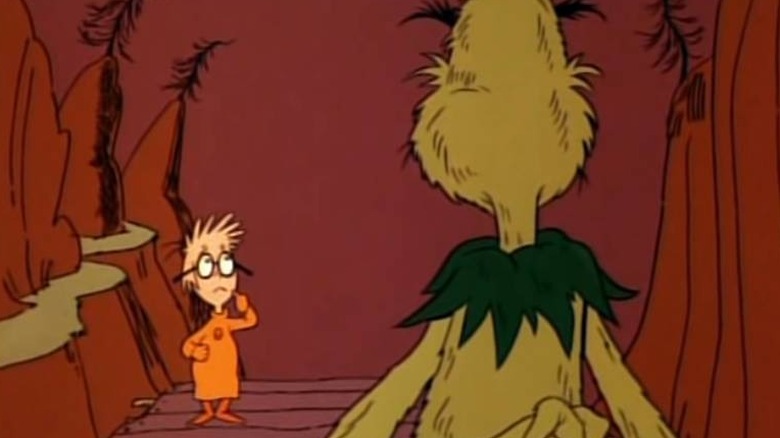The Emmy-Winning Grinch Prequel Nobody Ever Talks About
1966's animated "How the Grinch Stole Christmas" is a beloved holiday classic that continues to be rerun for new generations to this day. However, many people seem to be completely unaware that a prequel came out 11 years later called "Halloween is Grinch Night." Written by Dr. Seuss himself, the 25-minute cartoon seemed to want to create another holiday tradition, only with Halloween as opposed to Christmas. But despite the program winning an Emmy for outstanding children's special, it's been largely forgotten.
One can watch the special in its entirety on YouTube and make their own assumptions about why "Halloween is Grinch Night" failed to take off. The special boasts nine songs, but none of them are as inherently catchy as "You're a Mean One, Mister Grinch." The iconic Grinch voice performed by Boris Karloff has been replaced by Hans Conried. And despite "Halloween" being in the title, it actually has nothing to do with the holiday. Instead, the story is about the Sour-Sweet winds arriving in Whoville, which is a tradition where the Grinch can unleash untold horrors upon the innocent Whos.
Perhaps since Halloween was a non-factor in the story, VHS copies of the special that came out years later were retitled "It's Grinch Night" or simply "Grinch Night." That right there might explain why TV stations don't rerun the special throughout October, but that doesn't really get into just how downright bizarre the whole thing is.
Halloween is Grinch Night is disturbing for a children's cartoon
Many classic films receive follow-ups that are lost to the annals of time. The less said about "American Psycho 2" and "S. Darko," the better. The same appears to have happened to "Halloween is Grinch Night," and after watching it, it's abundantly clear why.
As mentioned earlier, the Sour-Sweet Winds mean the Grinch can do whatever he wants in Whoville. While this probably translates to him knocking over some flower pots, could he kill a Who if he wanted? It really sounds like it's operating by "The Purge" rules. One young Who, Euchariah, attempts to stall the Grinch before he gets to town, and is subjected to abject, surrealist horror: he's chased by a giant lobster and basically steps into a Salvador Dali painting. It's wild stuff to expose children to.
Then there's arguably the most depressing aspect of the short. The Grinch's dog, Max, has a song called "How Many Times," where he refers to himself as the Grinch's slave and laments how he's no longer a puppy with a bright future ahead of him. It's genuinely sad and paints Max's relationship with the Grinch in a completely different light. Their partnership isn't great in "How the Grinch Stole Christmas," but that poor dog suffers so much in the lead-up to that special's events. With all this, "Halloween is Grinch Night" doesn't exactly leave viewers feeling all warm and fuzzy.
There's no enduring message in Halloween is Grinch Night
So how does young Euchariah save the day? He simply points out that since the Grinch has wasted so much time scaring him, the Sour-Sweet Winds have already passed, and his opportunity to inflict chaos on Whoville will have to wait for another day. The ending of "Halloween is Grinch Night" really sums up why the cartoon isn't as fondly remembered as "How the Grinch Stole Christmas."
The Christmas special sees the Grinch start off as a miserly fellow, a good start for any classic Christmas story. After stealing everything in Whoville, he realizes the Whos don't care about material possessions as long as they have one another. Christmas isn't about presents; it's about loved ones. It's a heartwarming message kids can understand, and the Grinch even gets a well-rounded character arc by joining the Whos in a feast. There's no character development or lesson to be learned in "Halloween is Grinch Night." He sets out to do evil and then goes back home because he ran late.
With this being a prequel, it makes a little sense that the Grinch couldn't grow as a character. He needs to remain selfish and sinister because that's how he is at the beginning of "How the Grinch Stole Christmas." But the result is a lackluster outing that fails to encapsulate the joy and spirit of Halloween as its predecessor did for Christmas. With greater recognition, perhaps it could garner cult status, but "Halloween is Grinch Night" will likely never be adapted as a live-action movie starring Jim Carrey.


